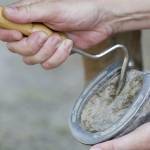Cold Weather Hoof Care

Healthy horses generally get along well in cold weather as long as they have adequate forage, plenty of water to drink, and the option to use a windbreak or shelter. Thicker coats help to keep them warm, as does the heat produced by the fermentation of fiber in the hindgut. Even standing in snow isn’t usually a problem, as the blood supply to the hooves, ears, and tail is regulated by a shunting system that sends larger or smaller amounts of blood to these areas as needed.
Hoof growth slows somewhat in cold weather, so cracks and other defects may not grow out as quickly during the winter months. For unshod horses, hoof walls may be left a little longer to give horses more clearance and help them avoid sole bruises as they walk on frozen mud.
Shod horses will need help with traction on snowy and icy ground. Shoes with borium patches, studs, or another nonslip configuration will give them more secure footing. Talk to your farrier about these options.
Galloping and jumping on frozen ground increases the concussion that is normally absorbed by softer surfaces. The increased pounding can lead to hoof cracks or lameness. If you don’t have access to an unfrozen riding area, it’s a good idea to limit the amount of intense work you ask your horse to do.
Bare hooves usually shed snow naturally, and hooves stay clean with little effort. Shoes, however, tend to collect hardened snow that’s dangerous to walk on and difficult to remove. Coating the soles with cooking oil or petroleum jelly may help for a while, but the best prevention is to ask your farrier to add a springy pad or rim under the shoes. These devices compress as the horse steps down and expand as each foot is lifted, popping the snow out before it can pack tightly.
Shod or unshod, your horse’s hooves still need to be picked out and inspected every day through the winter. Check for loose shoes, injuries, infections, and any sign of lameness. Don’t forget to schedule regular farrier visits even if your horse is enjoying a little downtime in the winter months.
For horses that need a higher level of hoof-related nutrients, Kentucky Equine Research offers Bio-Bloom PS (Bio-Bloom HF in Australia) to provide additional support for hoof quality and growth.








